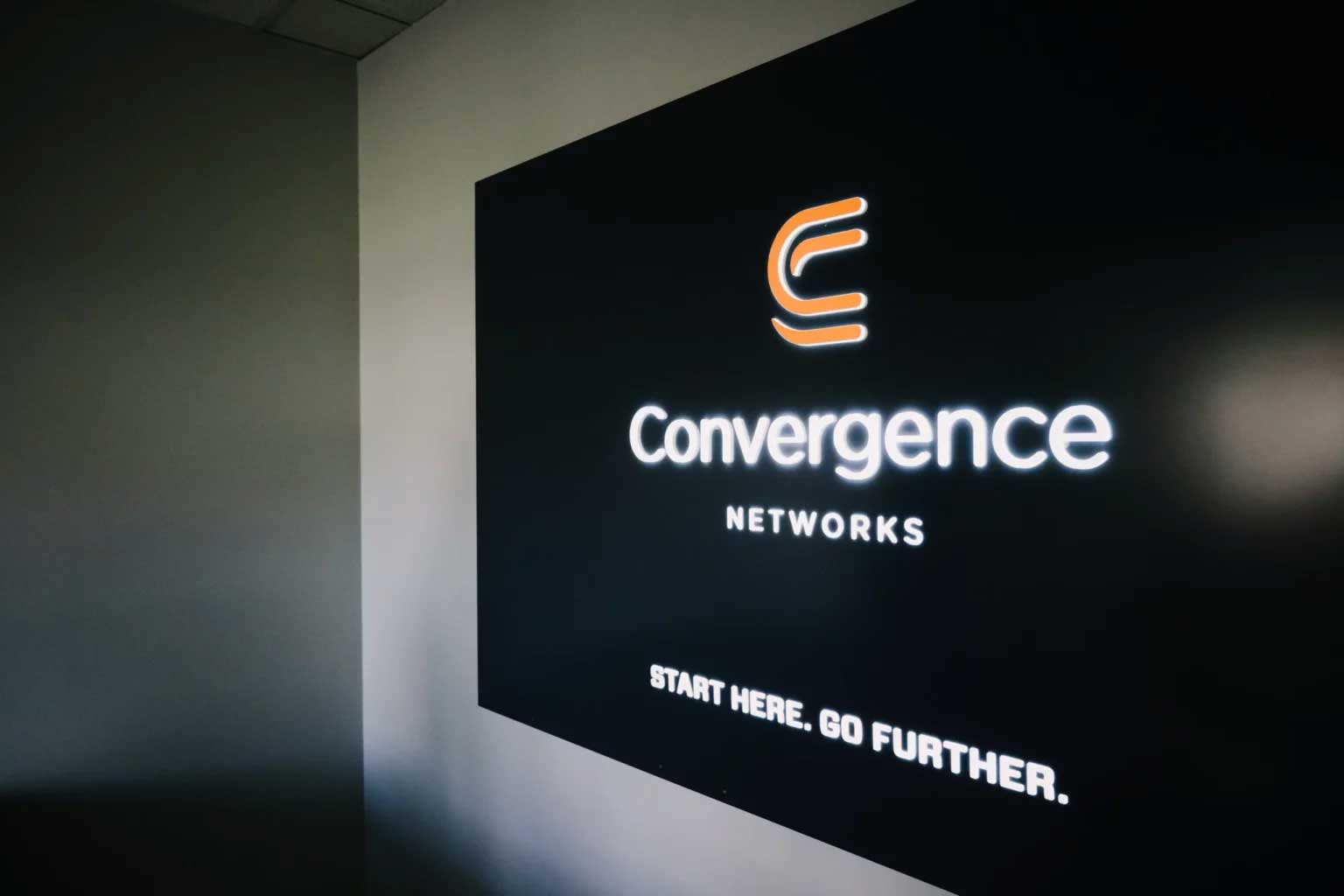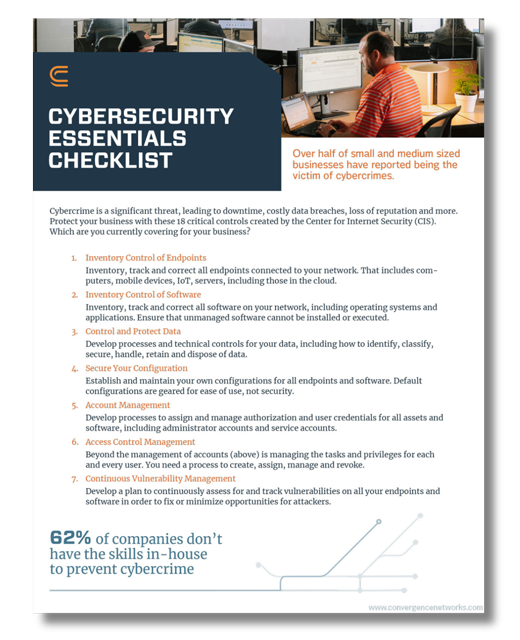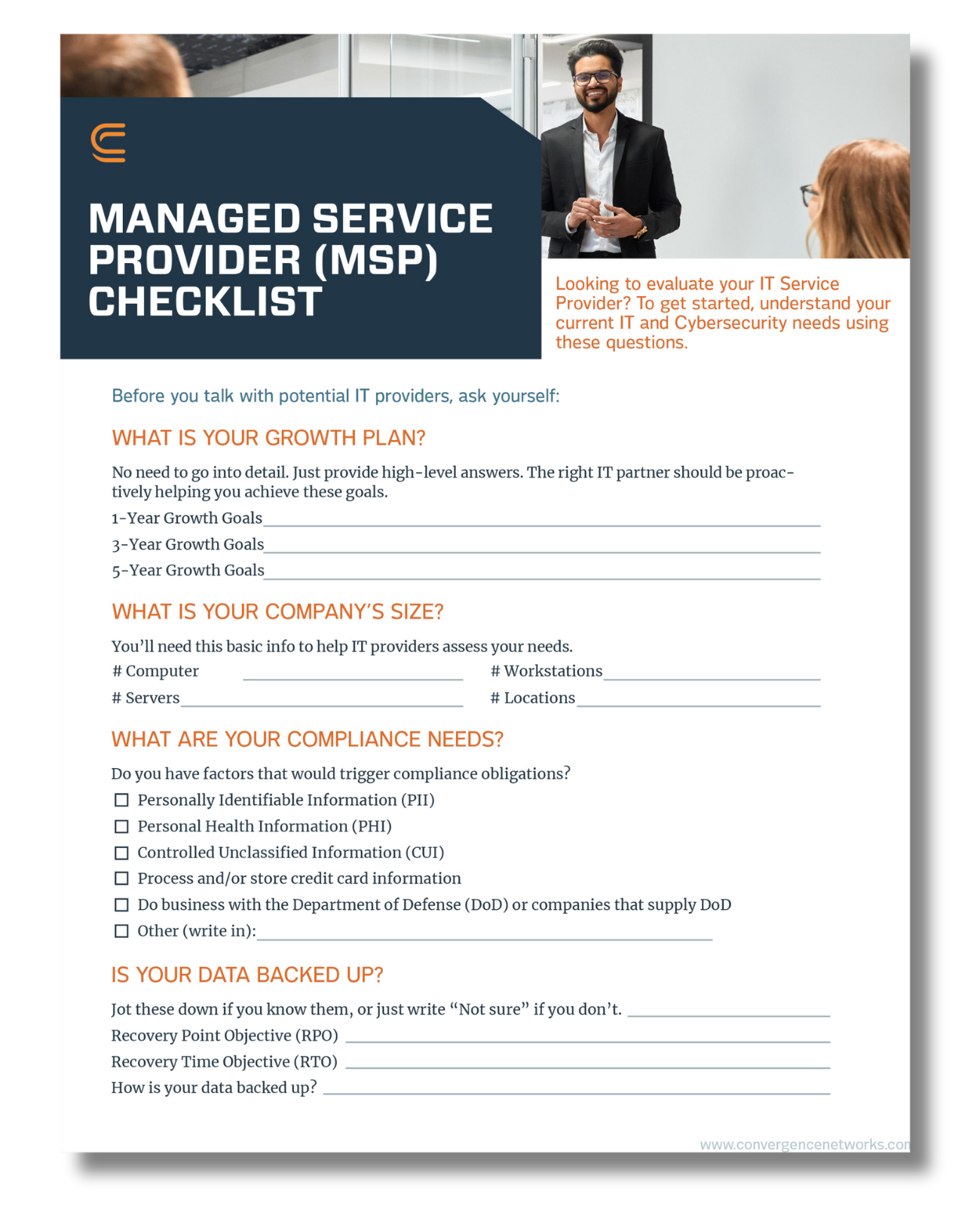Our Managed Services Are Designed to Scale Alongside Your Business as You Grow
Are you looking to engage with an experienced managed IT service provider who provides outstanding service and understands the technology solutions that best fit with your organizations? If so, let’s connect.

Why Choose Managed IT Services?
We prioritize employing and retaining remarkably capable people, ready to guide you in leveraging your technology to maximize your teams’ productivity.
What else sets us apart: our expertise in designing high-performing technology solutions with cybersecurity at the core. When the economy strengthens or your business experiences growth, we can expand alongside you. During tough economic times, we will guide you towards a cost-effective strategy.
Managed IT Services Offer Key Advantages for Businesses
We provide businesses like yours with IT support, proactive monitoring, and preventive maintenance.
We can serve as your outsourced IT service provider, or collaborate with your internal IT staff to better manage the complexities of technology.
Our goal is to ensure your staff is productive, that technology is used as a driving force for your business, and the burden of IT support is lifted.
In short, we will support your staff by monitoring and managing your technology services, desktops, laptops, and other IT devices so you can focus on what you do best.
- Reduce downtime and security issues by over 70% via proactive management.
- Cut the resolution time for problems to minutes versus several hours via our remote management technology.
- Resolve 93% of IT issues remotely and proactively.
- Save more than 35% in IT support costs.
- Ensure a predictable monthly cost that can be budgeted with no surprises.
- Eliminate the need to build in-house expertise in IT infrastructure and security technology.
- Provide economies of scale that let small and medium businesses benefit from Fortune 500 class, IT management and technical support at an affordable cost.
Delegate IT Operations to a Managed Services Provider for Business Success
Keeping up with daily IT operations can distract you from growing your business. It can also be difficult to maintain system updates, patches, and troubleshoot technical issues.
Frequently Asked Questions About Our Managed IT Services
Co-managed IT services (or hybrid IT services) is when you use a managed service provider (MSP) to supplement your in-house IT staff. Co-managed IT services can be the best of both worlds if your business is large enough to maintain an in-house IT team. You decide how much you want in-house and what you want from an MSP.
Here’s how it could work:
- Day-to-day business is handled by your in-house IT team with assistance or specialized expertise from your managed service provider as needed.
- Your MSP serves as a virtual chief information security officer or VCISO, basically becoming an outsourced CTO. Your internal IT team manages your systems and implements strategies created under the expert direction of your MSP.
- Your IT leadership is in-house but an outsourced managed IT team executes and manages your systems day to day.
Managed IT services involve a proactive approach to handling your company’s technology needs. Instead of reacting to problems as they arise, an MSP monitors, maintains and optimizes your IT systems 24/7/365. You can expect managed IT services to include:
- Network monitoring and security that protects your business from cyber threats with firewalls, antivirus software and proactive threat detection.
- Help desk support that provides expert assistance for your employees when they have technology issues.
- Data backup and disaster recovery to safeguard your critical data and ensure your business can quickly recover in the event of a data loss or system failure.
- Cloud services, which help manage and optimize your cloud infrastructure for better performance and scalability.
- Strategic IT consulting to help you plan and implement technology solutions that align with your business goals.
Think of an MSP as your outsourced IT department, handling everything from day-to-day maintenance to strategic planning, so you can focus on running your business.
Your managed service provider may offer a range of services, such as:
- IT support and helpdesk.
- Strategic IT roadmap development
- IT budgeting
- 24/7 remote monitoring and management.
- IT vendor management.
- Cybersecurity threat detection and response.
- Hardware procurement.
- Cloud migration and management.
- And more.
Yes, small businesses can enjoy a range of benefits from managed IT services, such as:
- Access to expertise: Most small businesses don’t have the budget to hire a full-time IT team with diverse expertise. An MSP gives you access to a team of skilled professionals who specialize in various IT areas.
- Cost savings: Outsourcing IT is often more cost-effective than hiring and training your own staff. Managed IT services are typically provided on a predictable monthly fee, making budgeting easier.
- Proactive support: MSPs proactively monitor your systems to identify and resolve issues before they cause downtime or data loss, helping you avoid costly disruptions.
- Enhanced security: Cybersecurity threats are constantly evolving. MSPs stay up to date on the latest security measures to protect your business from attacks.
- Scalability: As your business grows, an MSP can easily scale its services to meet your changing needs.
Without managed IT services, small businesses may struggle to keep up with technology demands, leaving them vulnerable to security risks and downtime. Partnering with an MSP can level the playing field, giving small businesses the same technological advantages as larger enterprises.
It’s not hard to find managed IT service providers. They come in all shapes and sizes, from the “guy in garage” to large national firms. The key is to choose the right managed service provider to partner with for your business. Here are the hallmarks of a quality IT partner:
- 24/7/365 monitoring and supporting.
- Fast response times and reasonable resolution times based on the level of impact the issue is having on your business.
- A high average customer satisfaction rating (CSAT) over several years and client references to back it up. The higher the rating the better.
- Experience with your type of business or industry (including compliance requirements) and client references to back it up.
- Willing and able to be on site in your offices if needed.
- Flexible contracts. You should be able to cancel all or part of your services with them with 30 days notice. You want a managed service provider that earns your business month after month, not locks you into a long-term contract.
After you pare down your options with the basics, it’s time to find out about their specific IT processes and protocols. Download our Choose IT Support Checklist for more questions to ask potential managed IT service providers.
Outsourcing means getting a job done by an external resource rather than your own employees. When it comes to IT, there are two main ways to do this:
- Project-based outsourcing: This approach involves hiring a vendor or contractor for a specific IT task, like moving to the cloud, providing after-hours help desk or offering a set amount of monthly support. These are often called “break-fix” solutions because they focus on fixing existing problems or filling a particular need. However, they don’t proactively address your overall IT and cybersecurity needs.
- Managed IT services: Partnering with a managed service provider (MSP) is a more comprehensive approach. Beyond project expertise and help desk support, an MSP actively works to prevent problems from occurring in the first place. Think of them as your 24/7 IT team, constantly monitoring and maintaining your network to ensure smooth business operations.
Managed service providers (MSPs) provide ongoing and proactive IT support for a company’s network, infrastructure and other technology needs. Managed support doesn’t just fix things when they’re broken: Your MSP will proactively work to keep your network up and running without interruption and partner with you to get the most productivity out of your business.
Some managed service providers offer a specific set of services to all customers while others will customize their support package to meet the specific needs of a business. With the latter approach you never pay for things you don’t need.
Managed IT services include protection of all your endpoints (devices, computers), data and infrastructure (servers). The best IT providers also proactively monitor and patch manage to prevent disruption. They also offer training to your team and technology leadership guidance to you.
A quarterly business review (QBR) is a meeting between your decision makers and your MSP. The QBR’s purpose is to make sure you are fully prepared for your future tech needs and to help your MSP team understand the trajectory of your business.
As the name implies, a quarterly business review is usually held quarterly, but can be scheduled more or less frequently depending on your business needs and goals. The QBR meeting itself usually takes about two hours and can be done onsite or virtually. A typical QBR report will include:
- A one-page business plan
- Your contact list
- Your IT assets
- Your workstation life cycle report
- A phishing report
During a quarterly business review, you are likely to discuss:
- Current issues, with real-time problem solving
- The latest tech innovation and IT trends that could impact your business
- General industry trends
- Feedback on your MSP’s performance
An IT service management (ITSM) company uses a process to create, plan, operate, deliver, support and implement your IT to best serve your customers and your business.
In other words, an ITSM manages and protects your data.
An ITSM’s scope of work includes all technology devices and services: your passwords, servers, printers, all software applications, even your laptops and the applications on them.
Some primary examples of what an ITSM can provide for your business include:
- Streamlining your infrastructure to better manage high-quality internet technology.
- Ensuring access to company data is only allowed to authorized current employees or end users (members of your staff, clients, etc.). The ITSM will purge the system of former staff members or clients who can still access your network because someone forgot to block their accessibility when they left the company or partnership.
- Advising you on the optimal type of backup to handle any possible data breaches whether they come from criminal action or natural disasters, or other unforeseen circumstances.
- Checking every application and every endpoint (scanner, computer, phone, etc.) to ensure they are up to date, and periodically update them to the latest patch if they are not.
- Examining your cybersecurity plans and processes and replacing them with ones that are safer, or reinforcing existing plans if need be.
There are numerous benefits of using IT service management: We’ve narrowed it down to our top seven:
- Reduced IT costs (scoping out redundant or obsolete assets)
- Reduced risk factors
- Reduced downtime when data breaches happen
- Adaptation to your specific needs
- Enablement of teams to share knowledge
- Improved efficiency, customer satisfaction and service
- Active breach prevention and strategizing for cybercriminal attacks as well as natural disaster mitigation
An ITSM doesn’t just offer tech support via a help desk or a service desk. Those support services are included as a part of the service, but an ITSM’s role is much broader than that.
The terms “service desk” or “help desk” are defined differently across businesses and industries, blurring what the phrase actually means. With an ITSM, it doesn’t matter. All you have to do is call or submit a “ticket” and the issue will be resolved.
An ITSM handles all service requests whether they are an incident that affects the system (my computer is down), a recurring problem (this application is stuck again), a change to the system (I need to add, remove or modify the database) or even requests for a new piece of equipment (I need a new computer).
The bottom line is this: Whatever IT issue you may have, an ITSM has the answer.
By partnering with our IT company, you’ll experience timely and efficient responses. Our resolution time averages 1 hour.
Our real-time solutions ensure your business experiences minimal disruptions and downtime due to technology and cybersecurity issues.
We support our team with the cutting-edge tools and technology they need to problem-solve quickly and effectively.
What sets our approach apart from other IT companies is our unique blend of strategic insight and comprehensive support.
With our team’s proactive approach and a 98 percent CSAT rating, our customer service is unparalleled.
Our tech support isn’t just available during business hours because we know technology issues can happen at inconvenient times. We’re here to help you 24/7/365, with an average response time of only a minute. Reliability and efficiency in everything we do is our goal.
Our local teams know the unique challenges that face businesses in your area. Combine that with our experienced vCIOs who work closely with you, you end up with a plan that aligns with your business goals.
All of our strategic plans include a proactive and security-first approach with insights to keep you ahead of the game.
Our security services, including 24/7/365 monitoring, dark web monitoring and managed SOC services, keep your organization safe. We proactively prevent threats with our real-time threat detection, addressing threats and potential issues before they escalate.
Why Choose Convergence Networks?
Could you get by with an “IT guy” who shows up (fairly dependably) when you need him to fix something? Maybe. But you probably won’t get ahead that way. With the right managed IT services, your organization can use technology to become more productive and efficient. With Convergence Networks, you get:
- Proactive IT support: As a managed service provider, we focus on preventing issues rather than just reacting to them, saving you from costly downtime and data breaches.
- Expertise: You gain access to a team of IT and cybersecurity experts with a wide breadth of knowledge. Our goal is to keep you up to date with the latest technologies and threats.
- Cost-effectiveness: Managed IT services are typically more affordable than hiring and maintaining an in-house IT team.
- Local Dedicated Service: Get personalized, local IT support to clients backed by team members who stand ready to assist when you need it.

Is Your Technology Working Hard or Hardly Working?
Whatever business you’re in, technology helps you achieve your goals and stay ahead of the competition. When your IT isn’t optimized, your staff will be frustrated, your initiatives could take longer and you could be vulnerable to cybercrime.
Why struggle when you can get ahead with the help of Convergence Networks managed IT services?
Security-First Managed IT Services
Our Convergence Networks experts understand today’s cybersecurity landscape. A strong security posture is critical and can’t be ignored. Fortunately, it can be outsourced to a knowledgeable managed service provider.
When you partner with Convergence Networks, we deliver comprehensive security measures that include:
- Continuous remote monitoring.
- Strategies for mitigating risk.
- Advanced data protection methods.
- Robust planning for disaster recovery and business continuity.




















